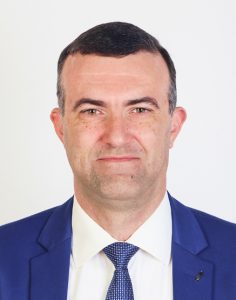
Researcher

Nikolay Pavlov is a Marie Curie Fellow at the Vienna-based research and innovation company SYNYO GmbH, where he coordinates a H2020 research project on the role of concept development and experimentation (CDE) for EU conflict prevention and peace-building. He has a strong background in the social sciences with MA degrees in International Relations (from Sofia University) and Law (from New Bulgarian University). He earned his PhD degree on management of security and defence research in the public sector from the University of National and World Economy in Sofia. He worked previously for the Bulgarian Academy of Sciences’ Centre for National Security and Defence Research and as Bulgaria’s NCP (National contact person) for the Security theme under FP7. He has also acted as an independent evaluator and reviewer of security research projects for European institutions. He has published 2 books and more than 40 scholarly articles in the fields of geopolitics and regional studies, security research management, crisis management, disaster risk management, and the EU’s Common Security and Defence Policy (CSDP).
ResearchGate profile: https://www.
SYNYO GmbH
The MSCA project CDE4Peace is hosted by the SYNYO GmbH.
SYNYO is a research-based company focusing on research, innovation and technology located in Vienna, Austria. SYNYO explores, develops and implements novel methods, approaches, technologies and solutions in various domains with a particular focus on tackling societal, political, ecological and economic challenges. SYNYO has access to a vast network of knowledge including research institutions, networking organisations, technology providers and industry leaders being well connected within the scientific community and will provide own research and innovation network platforms in the near future.
Gugushvili, A., Jarosz E., (2019) Inequality, validity of self-reported height, and its implications for BMI estimates: An analysis of randomly selected primary sampling units’ data. Preventive Medicine Reports, online first, DOI: 10.1016/j.pmedr.2019.100974
Gugushvili, A., Jarosz, E., McKee, M. (2019) ‘Compared with whom? Reference groups in socio-economic comparisons and self-reported health in 34 countries’. International Journal of Epidemiology, online first, DOI: 10.1093/ije/dyz122
Jarosz, E. (2019) ‘Unequal times: Social structure, temporal perspective, and time allocation in Poland’. Social Indicators Research, 141(3): 1189-1206. DOI: 10.1007/s11205-018-1866-7
Jarosz, E., (2019) ‘Unequal eating. Daily meals and social class’ in: Gershuny, J., and Sullivan, O., (eds.) ‘What We Really Do All Day? Insights from The Centre for Time Use Research’, London: Penguin Random House UK
Jarosz, E., (2018) ‘Lifestyle behaviours or socioeconomic characteristics? Gender differences in covariates of BMI in Hungary’. Obesity Science and Practice 4(6): 591-599. DOI: 10.1002/osp4.316
Jarosz, E. (2018) ‘Harmonizing Time-Use Data’. Harmonization: Newsletter on Survey Data Harmonization in the Social Sciences, 4(1): 16-21.
Jarosz, E. (2017) ‘Class and eating. Family meals in Britain’. Appetite 116, pages: 527-535. DOI: 10.1016/j.appet.2017.05.047
Jarosz, E. (2016) ‘Food for thought: A comparative analysis of eating behavior in Poland, Armenia, and the United States’. Food, Culture and Society, 19(4), pages: 655-679. DOI: 10.1080/15528014.2016.1243766
Jarosz, E. (2016) ‘The Duration and Dynamics of Leisure Among The Working Population in Poland. A Time-Use Approach’, World Leisure Journal, 58, pages: 44-59. DOI: 10.1080/16078055.2015.1088467
Jarosz, E., Papastefanou, G. (2013) ‘Societal determinants of complexity in personal leisure: A comparative study of Germany and Poland’, GESIS Working Papers No 28.
Papastefanou, G., Jarosz, E. (2012) ‘Complexity of Leisure Activities over the Weekend: Socio-economic status differentiation and effects on satisfaction with personal leisure’, GESIS Working Papers No 26.



